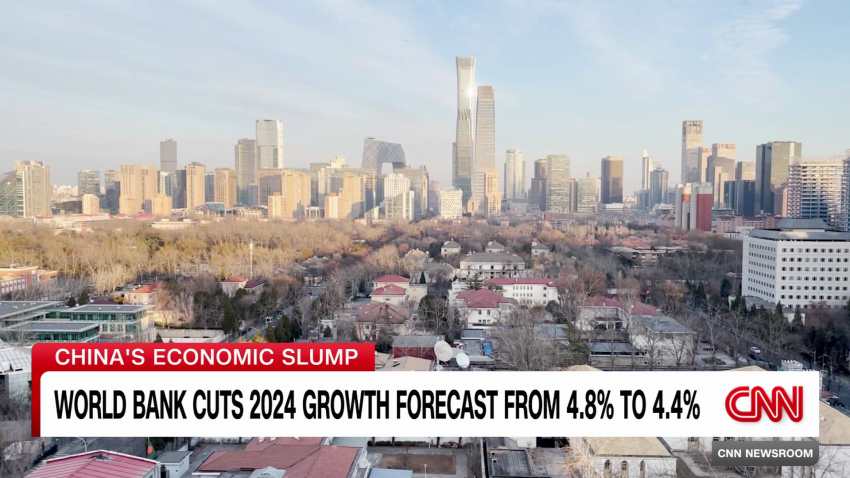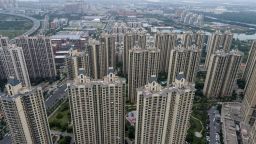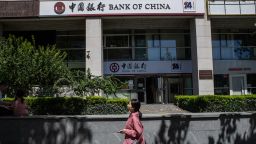For the second time in just over two months, Country Garden has warned investors that it could default on its $190 billion debt in a reminder that China’s real estate crisis is far from over.
The company said it had not made a repayment of 470 million Hong Kong dollars ($60 million) due to overseas bondholders by Tuesday.
The troubled developer, formerly China’s largest, is battling a liquidity crisis and has dodged multiple defaults in the past month. But persistent weakness in the property market and a difficult refinancing environment have hobbled its ability to raise enough cash to service its billions of dollars of debt.
It said sales of apartments fell by 81% in September, compared with the same month last year.
Country Garden “expects that it will not be able to meet all of its offshore payment obligations when due or within the relevant grace periods,” it said in a Tuesday filing to the Hong Kong Stock Exchange.
“Such non-payment may lead to relevant creditors of the Group demanding acceleration of payment of the relevant indebtedness owed to them or pursuing enforcement action,” it warned.
The deepening woes at Country Garden offer more evidence that China’s all-important property market is languishing in a persistent downturn, which poses a major threat to the country’s growth prospects. Analysts say it could take years to climb out of this crisis, as housing demand is waning because of an aging population.
The risks were underscored when a group of creditors of Evergrande, which defaulted in 2021 and is trying to fend off liquidation, said in a statement sent to CNN that the developer could suffer an “uncontrollable collapse” because of “botched” efforts to restructure its vast debts.
Such a scenario could hit households and further undermine confidence in the battered real estate market, setting back Beijing’s efforts to revive the sector.
Massive liabilities
Country Garden reported a record $7 billion loss for the first half of 2023 In late August and said it “may default” if its financial performance continues to deteriorate.
As of the end of June, Country Garden had around $15 billion worth of debt due by June 2024, according to the most recent information released by the company. Its total liabilities were around 1.36 trillion yuan ($190 billion).
If it ends up defaulting, its debts would need to be restructured and its creditors could present a winding-up petition against the company.
Country Garden said it had hired advisers to evaluate the company’s liquidity conditions and formulate a “holistic solution” intended to address its current offshore debt risk and enable it to restore business operations.
It didn’t elaborate about the possible plan, but said China International Capital Corporation Hong Kong Securities and Houlihan Lokey (China) would serve as its financial advisers. Sidley Austin would be its legal adviser.
Country Garden was one of the few major private developers still standing after a liquidity crisis engulfed China’s property sector two years ago. But things have taken a turn in the past few months.
In early August, the company acknowledged that it was facing its “biggest difficulty” since its establishment in 1992, citing deteriorating sales and a difficult refinancing environment. The news shocked investors, triggering a broad sell-off in China’s property stocks.
The fact that a once seemingly bulletproof firm was struggling with a cash crunch underscored how entrenched the property meltdown had become. It also highlighted the challenges Beijing faces to contain the problem.
Significant uncertainty
On Tuesday, Country Garden reported that its sales plunged further in September, down 81% from a year earlier. That followed a 72% drop in August and a 60% fall in July.
The company faces “significant uncertainty” regarding asset disposals, and its liquidity position is expected to remain “very tight,” it said.
It plans to “cooperate and engage in dialogue with all creditors to reach a feasible solution as soon as practicable,” it added.
If confirmed, a debt restructuring for Country Garden would be the latest for a Chinese home builder.
Evergrande, the world’s most indebted developer and once China’s second largest, was declared to be in default in late 2021. Afterward, the government intervened to prevent a disorderly collapse of the company and appointed a risk management committee to guide its restructuring.
In March 2023, the company unveiled a long-awaited plan to restructure more than $19 billion of its offshore debt and has been seeking creditor approval for it since then.
But those plans were thrown into disarray six months later when Evergrande surprised investors by announcing that its founder and chairman Xu Jiayin had been detained by the Chinese authorities on suspicion of crimes, casting serious doubt over the future of the company.
Sunac China, which was China’s third largest homebuilder in 2021, has also proposed to overhaul its liabilities after struggling to make payments.
In March, it unveiled a $9 billion restructuring plan after reaching agreements with a group of key bondholders. Last week, it won approval from a Hong Kong court for the plan, the first for a major Chinese developer that could provide a template for its industry peers.









